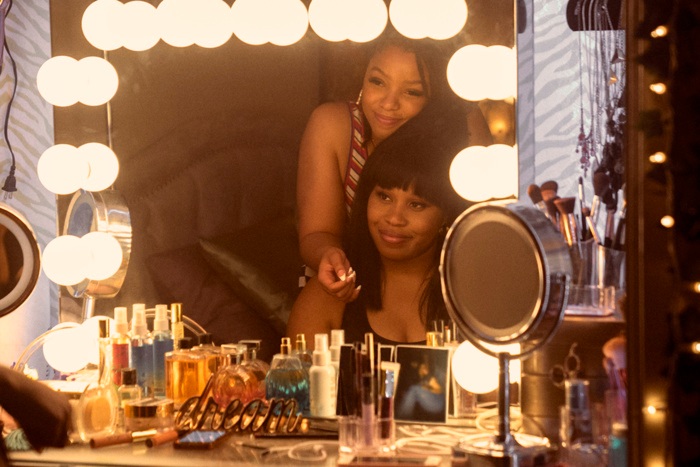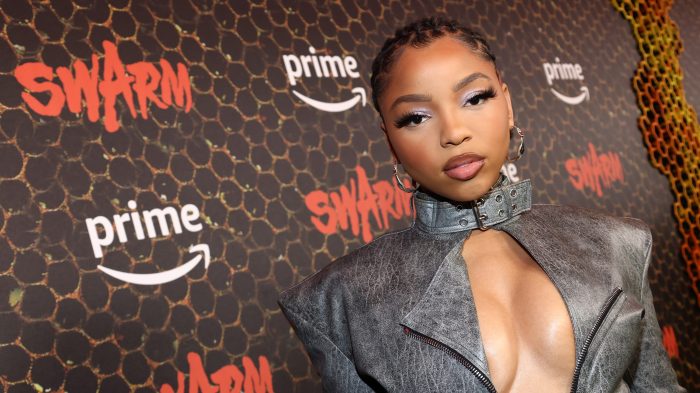Two minutes into the first episode of Swarm, Donald Glover’s latest project that he co-created with Atlanta alum Janine Nabers, the show took a hard left with a voyeuristic sex scene that left little to the imagination. And that’s when the uproar started. Not so much for the scene itself, but because it featured singer and actress Chloe Bailey.
The initial shock is understandable — many watched Bailey grow up, first in the group Chloe x Halle with her sister, then on grown-ish. Though the 24-year-old has been increasingly letting folks know she’s all grown up, Twitter overflowed with people questioning Bailey’s career choices, admonishing her for not knowing better, or wondering whether she sought approval for the scene from her mentor Beyoncé. In short, things got weird.
Suddenly, dozens of people who don’t even know Bailey, much less have an actual relationship with her, chastised the actress or offered unsolicited life coaching. Perhaps predictably, her equally famous male co-star in the scene, Snowfall’s Damson Idris, received little to no criticism. But fixating on Bailey in this manner showed Swarm‘s prescience. The same parasocial dynamics the series explores revealed themselves across social media, possibly making the point even better than the creators ever imagined.
Social media gives us unprecedented access to celebrities, and, like Swarm‘s lead character, Dre (Dominique Fishback), some of us believe we know our favorite performers intimately. Dre’s affection for Swarm‘s Beyoncé stand-in takes that idea to a dark and disturbing extreme. The other side of that coin is obsessing over someone enough to create a fictional version of a real person and feeling disappointed when reality clashes with make-believe. Bailey, through no fault of her own, bore the burden of the unrealistic expectations created by living in a giant fishbowl.
And obviously, she’s not the only one.
Most recently, Ciara found herself in a similar controversy, thanks to her Oscar night attire. Some debated whether her sheer dress was appropriate for a wife and mother, or somehow disrespectful to her husband. Besides the fact that Ciara’s wardrobe choices aren’t subject to committee approval, it takes a lot of entitlement to presume what Ciara and Russell Wilson decide behind closed doors. To say nothing of the fact that it takes a lot more than a see-through dress to make anyone a bad mother. Ciara responded jokingly, but not everyone in a similar position does. And truthfully, they shouldn’t have to say a word.
Related Story
On ‘Renaissance’ Beyoncé is at her curatorial bestRead now
Swarm’s tagline is “Stan Correct,” meaning it never hides its intentions or topical target: overeager fans. The backlash toward Bailey is a facet of stan culture. “Stan” might seem harmless today — some even proudly wear the term like a badge of honor — but let us never forget its origins, Eminem’s 2000 hit, “Stan.” In the song, Stan is an obsessive fan who can’t accept that his idol has a life outside of entertainment. He falls deeper down a rabbit hole when Eminem doesn’t act the way Stan assumes he will since, in his mind, they’re two peas in the same troubled pod. In essence, Stan believes Eminem owes him. Therein lies a core question at the center of the debate:
Does Bailey owe her fans anything besides general gratitude?
When fans stream her music, buy her concert tickets, and contribute to her social media following, should she return the favor by maintaining a specific image? Is she wrong for doing a brief sex scene in a horror project, a genre that often uses nudity and sex as transgressive acts or for shock value, and expecting them to like it? Stan culture emphatically says yes.
Stanning involves seeing ourselves in someone famous and either identifying with their actions or hoping that one day, we might follow in their beautifully drawn footsteps. Ultimately, those disappointed in Bailey’s choices believe she did something they never see themselves doing. To them, her choices no longer reflect her; they mirror those of an entire fan base devoted to a romanticized version of Bailey that doesn’t exist. And since Beyoncé is her mentor, her choices tangentially become a product of said mentorship. So Bailey’s responsibility falls to herself and her fans, an idealized Chloe Bailey, and of course, Beyoncé. That’s a lot.
 Chloe Bailey (left) and Dominique Fishback (right) star in Swarm.
Chloe Bailey (left) and Dominique Fishback (right) star in Swarm.
Warrick Page/Prime Video
How can anyone live like that? More importantly, why do we ask anyone to live like that? Why subject people we don’t know to endless back-and-forth while tacitly taking their autonomy?
As “Stan” shows, this isn’t a new phenomenon, as that song dropped more than 20 years ago. But social media made the microscope under which we put certain people even bigger. Those in the limelight often forfeit anonymity and the ability to do things those of us with fewer commas in our bank accounts take for granted, such as going to a convenience store in the middle of the night unnoticed. But hero worship and our ever-growing infatuation with celebrities seemingly rob them of a basic human need: self-expression. And the irony is for everyone asking, “Why, Chloe, why,” she explained herself a whole week before Swarm dropped.
“When I first read the script, I was like, ‘Oh, this is insane, this is incredible,’” she said. But Bailey also saw the challenge of doing something on the screen for the first time and the fear of doing anything new, much less a sex scene. “And then I realized, you gotta do that sex scene, girl. And as open and liberal as I am about my body, I was very scared because I haven’t had that many partners.”
By taking on the role in Swarm, Bailey didn’t dive into the deep end without thought and consideration. She approached it as someone getting out of their comfort zone for their craft and creatively expressing themselves. Whether everyone agrees with her choice is one thing, but acting like disappointed parents and publicly disapproving of her takes it beyond simply disagreeing.
Related Story
 Donald Glover gave us the best and worst of ‘Atlanta’ this yearRead now
Donald Glover gave us the best and worst of ‘Atlanta’ this yearRead now
Swarm illustrates how someone with that mentality sees the world and the results of that hazy view. It shows how positive or negative feelings toward a celebrity turn toxic and how it affects the surrounding world. The show reminds us that while calling ourselves Stan may sound cute, the meaning behind the term is harmful and potentially dangerous. Relationships with stars on social media are usually parasocial — it’s a one-way street. Just because they tweet about their day or post vacation pictures on Instagram doesn’t mean we know them. We know what they want us to know, which is an important distinction.
Bailey isn’t a loved one searching for a life raft due to bad life choices, nor is she a wayward woman searching for the right path. She isn’t the first person to do something some fans might disagree with, and she surely won’t be the last. Being a fan is great, but once we feel hurt regarding someone’s choices that ultimately don’t affect us, we become something else. Swarm doesn’t indict fame or fans, but it wants to discuss fandom’s place in our lives and how we engage with the artists we love.
The fact that Bailey’s seconds-long sex scene became the topic of such discourse says the show arrived right on time and that a lot of us missed the message entirely.
Marcus Shorter is a communications professional and writer. When he’s not scribbling thoughts for Consequence, Cageside Seats or Bloody Disgusting, he’s getting extra nerdy about rap lyrics, politics, poetry and comic books.



